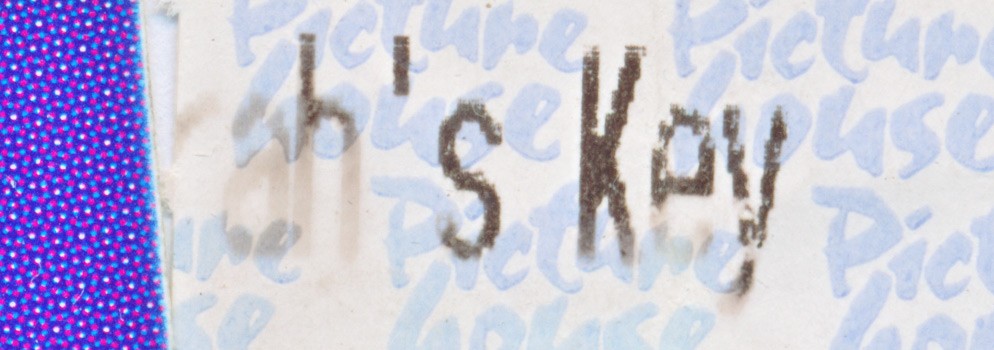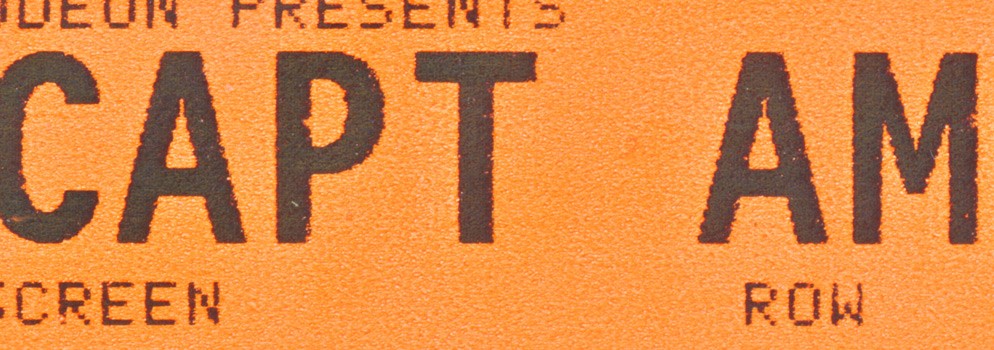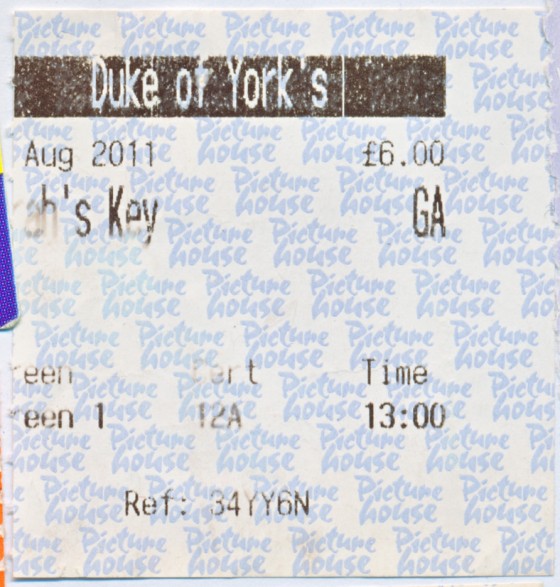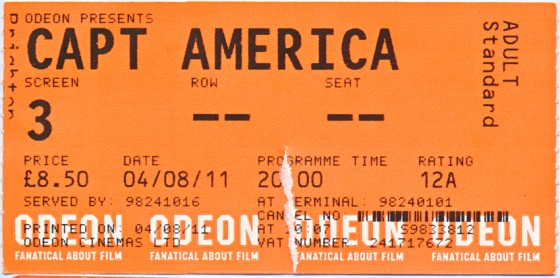Elle S'appelait Sarah & Captain America

Why I hate Nazis
If you were to read my notes from Elle s’appellait Sarah (and I should have known: the actual title in French She was called Sarah, which became the in every way equally bland and unappealing Sarah’s Key – changing the title of the film: never a good sign, see here), you would see ‘phony, phony, phony’, written over and over again. At the twentieth time, I invented, and then abandoned, a complex mathematics to express the exponentially growing fake-osity, which I would use if for nothing else than to reduce the hand strain. But it was dark, and so I just underlined it, and wrote it REALLY BIG, thinking no doubt thinking that the filmmakers, monitoring my every move from space, would be able to read it via satellite surveillance. Yes, I’m aware it makes no sense but it’s a great deal more likely than what I actually believe: that they’re going to read this and change the way they make movies.


Elle s’appellait Sarah, suffers – poorly – in comparison to another film which addresses the French collaboration with the Germans: OSS 117: Rio ne répond plus. Okay, that’s not entirely true, since OSS 117: Rio ne répond plus addresses the French collaborations with the Germans more completely in one scene.
The film takes place in the 1960s, and the main character (OSS 117, played rather well and strangely by M. Jean Dujardin) is a deliberate sexist and racist throwback to the spy films of the time. As he is told that he must recover a microfilm that contains names of high ranking officials that helped the Nazis during the war, he responds, innocently: ‘But General DeGaulle said that all of France was in the resistance.’
And it seems that the filmmakers may have seen this very scene and, not realizing that it was a comedy, made it the actual premise of their film. Beginning with the least realistic magazine staff meeting ever captured on celluloid (sorry, high end HD), Ms. Scott-Thomas (and the filmmakers) feel that they must explain: ‘It was like the Superdome in New Orleans. Only a million times worse’. Holocausts. They’re like, bad, and stuff.
We soon come to discover that, other than a few minor characters, everyone was really rather nice during the French deportation and murder of their Jewish citizens. Ms. Scott-Thomas investigates her family’s apartment, and it is revealed…that they didn’t know that they had stolen their apartment from a displaced Jewish family at all. When they do find out about Sarah, they…send her money every month, and help her hide from the Nazis.
This kind of backpedaling apologia is politically egregious to be sure, but such a subject could be interesting in a comedy (see above). What such a tepid stance serves to do here is make the film incredibly dull, as having done nothing wrong in what was apparently an accidental collaboration with the Nazis, an event that occurred without anyone actually participating in it, it means that the characters have zero reason to keep so many secrets. Nevertheless, they do, as when we have Mr. Aiden Quinn as Sarah’s adult son saying, ‘I don’t want to hear it. It’s not convenient for the plot, I’m afraid.’ I’ve added some dialog there, but this was basically the gist (I know as it was underlined most emphatically in my notes). Also, I gave him an English accent for some reason. I was bored.
Sarah, the only potentially interesting character, remains a concealed, one could even say deliberately suppressed, character. Having accidently killed her brother by locking him in a closet to save him from being taken by the French police (I really don’t want you to see this film), the film emerges as a mimeograph of the vastly more interesting Sophie’s Choice, a film from which seemingly every plot point of Elle s’appellait Sarah is lifted and rendered banal. The only interesting character (Sarah) kills herself, but we never really get to know her, as if the film and its authors are afraid to look, and at something that needs very much to be looked at: the nature of guilt, choice and blame. Instead, the only choice made here is whether or not Ms. Scott-Thomas will keep her baby. Would it shock you to find out that this is the only film in the history of film where a character actually gets an abortion? Well, that’s exactly the point: it would shock you, and she doesn’t.
She names it Sarah.
Just imagine how many underlines I drew when I saw that.

It’s really not fair to single out the filmmakers in question, especially since the real problem is Nazis, or rather the problem is that Nazis were real. Okay, the real Nazi was the problem; that’s got to be it.
It is a strange phenomenon that Nazis, and more specifically, the Jewish/Slav genocide of the 1930s and 40s, have become more and more cinematically (and politically) present the farther and farther we move away from the actual events in time. Beginning with a film that has never been shown (The Day the Clown Cried), and ending (or so I thought) with a film that joyfully ignores history entirely (Inglorious Basterds), it is a subject that has seen varieties of success and failure. I’m not sure why our various Zeitgeists are so compelled to relive this particular event (rather than the genocides of Stalin, or Mao, or for that matter, the Americas, oh, sorry, answered my own question), but whatever the intent, the retelling of the Holocaust has done exactly the opposite of what was originally intended: it has rendered the subject, and the films about it, trite.
This is what aid workers often call compassion fatigue, referring to themselves as well as their potential donors (Remember Haiti? Don’t worry if you don’t; the Haitians do). In filmic terms, we have been exposed to scenes like what takes place in the Vel’ d’Hiv and the camps of Bouches-du-Rhône and over and over again. Even if you’re not a heartless cynic like myself, and getting back to the point I was trying to make a paragraph ago, when you depict real events, you run the risk of trivializing the violence in the very act of showing it. The best film ever made on the Holocaust – HBO’s Conspiracy – has nary a bullet fired. Instead it demonstrates how choice and consequences actually operate, how repellent and inhuman events arise from the best considered motives, and how easy it is to give in, even when you know better. You should see it, by the way, if you haven’t.


When I said that this subject has come to its filmic end with Inglorious Basterds, I meant it. What remains are the tepid and disingenuous ghostly remainders of a culture that ‘must never forget’, as long as memory involves no accuracy or insight.
Right after this, I saw Captain America, which I thought would make a good companion piece on how violence is shown (since, within its strange PG13 universe, killing people by disintegrating them into dust is much more acceptable to children then showing a drop of blood).
Instead, Captain America is more relevant as a representative of the way in which the overexposure of the holocaust has led to a kind of desperate and tired hybridization, Nazi-horror movies (The Unborn), Nazi-zombies (Dead Snow, World War Z), Nazi-vampires (True Blood, Bloodrayne 3), Nazi-alien-mutant steam punk (Mutant Chronicles), even Nazi-zombie-occult-robots (Return to Castle Wolfenstein – though sadly that film is currently in turnaround).
Captain America: The Take

$1.00
With Elle s’appellait Sarah we have not so much a Nazi movie as but a zombie Nazi movie, a creature so afraid to deal with its subject and its attendant emotions that it emerges half-alive, unwilling to look at the uncomfortable depths of either history or drama. And like all zombies, you know there’s only one way to stop it: an extremely well-worded essay.
Did you get that, spy satellite? Or do I need to make the font bigger?
Elle S’appelait Sarah: The Take

-$6.00
The Lonely Comments Section

 [logo]
[logo]

